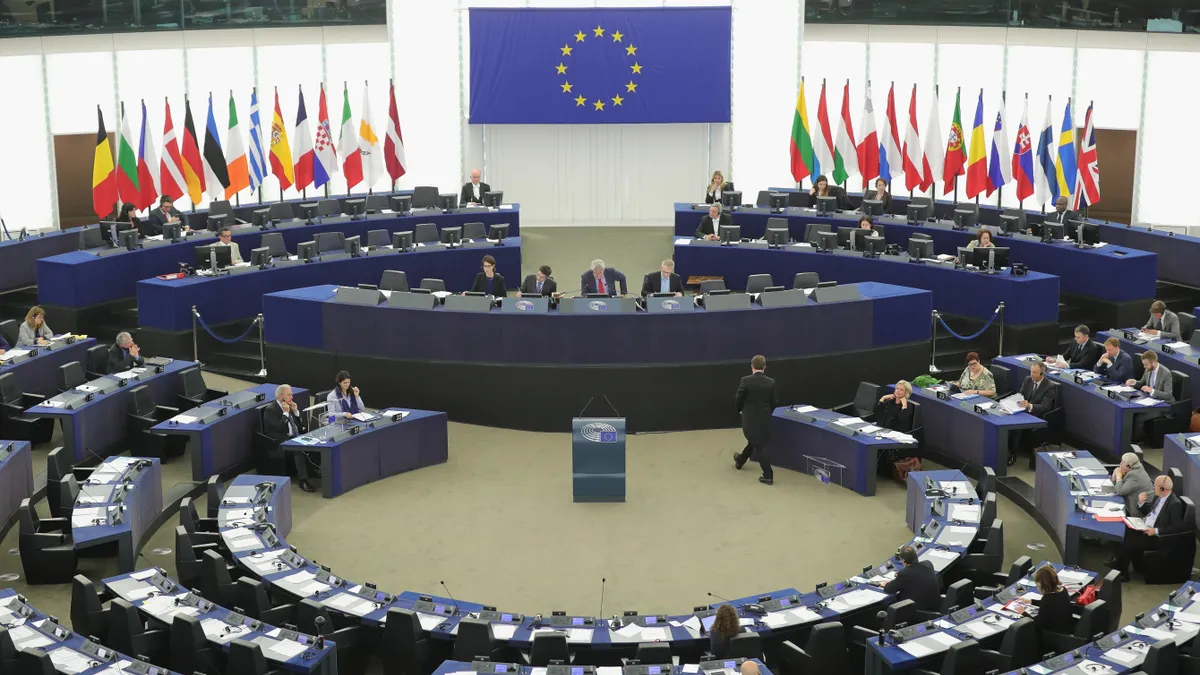Dive Brief:
- Members of the European Parliament backed a two-year delay for developing sustainability reporting requirements for non-EU companies and specific sectors Wednesday. The approval follows the European Commission’s October proposal to postpone the Corporate Sustainability Reporting Directive's adoption timeline, first laid out in its 2024 Commission Work Programme.
- The deferral was approved by the European Parliament’s Committee on Legal Affairs by a 21-2 vote, allowing reporting requirements for certain sectors to be delayed until June 2026. The sectors include oil and gas; mining, coal and quarrying; road transport; motor vehicles; textiles; agriculture and farming; food and beverage; real estate; power production and energy utilities; and capital markets, insurance and banking.
- The approved proposal also extends the reporting timeline for companies headquartered outside of the European bloc, who will now have until 2026 to begin complying with the CSRD. In its draft, the Commission said it recognizes the “extra burden” these reporting requirements impose on companies and aims to simplify these requirements and reduce such burdens by 25%.
Dive Insight:
The two-year delay aims to provide companies with additional time to first focus on implementing the broader sustainability reporting requirements laid out in the CSRD. Companies must include those reporting metrics in their annual reports beginning in 2024, before they start adhering to sector specific standards outlined under Article 29b(1) in the directive.
“The Commission also recognizes the challenge of maintaining the high ambition defined in the Corporate Sustainability Reporting Directive … while not going so fast that we endanger the correct and high-quality implementation of the reporting requirements themselves,” Thomas Dodd, the European Commission’s team leader of sustainability reporting, said during the committee hearing.
Dodd said these considerations were the motivation behind the Commissions’ proposal to postpone the adoption of sector specific standards and standards for non-EU companies.
Under the CSRD, companies would be required to provide comprehensive and detailed disclosures regarding their sustainability efforts. The directive, which impacts all companies listed on an EU-regulated market — including both EU and non-EU entities — also affects U.S. companies with EU subsidiaries. An EU subsidiary of a U.S. company would be required to report its sustainability efforts and operations if it meets certain thresholds regarding asset, revenue and workforce figures.
U.S.-based companies would also be required to comply with the reporting standards if they generate an annual net revenues exceeding $158.6 million for two consecutive financial years or have at least one branch or subsidiary in Europe that generates an annual net revenue exceeding $42.3 million in the preceding financial year.
Last month, Securities and Exchange Commission Chair Gary Gensler warned that if the agency didn’t publish a final climate disclosure rule or if the rule was overturned by the courts, American businesses would be at the behest of the EU’s climate disclosures.
Without the SEC disclosure rule and a substituted compliance agreement with the EU, more than 3,000 U.S. companies would have to abide by the CSRD’s double materiality standard, which requires companies to disclose how their actions affect both investors and society more broadly, according to a Deloitte estimate.











